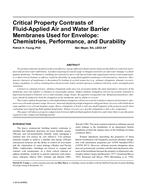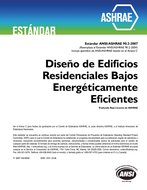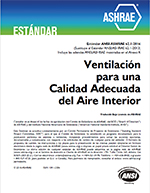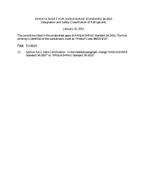Description
Two primary elements needed to achieve an effective, energy-efficient commercial envelope are the ability to control air movementand prevent water infiltration. A product enjoying increased usage to mitigate enclosure air and water leakage is a fluidappliedmembrane. Furthermore, buildings are expected to move with lateral loads and expand and contract with temperature,so a third critical element to address would be durability by using fluid-applied membranes with elastomeric character. Elastomericcharacter of membranes is determined by looking at several properties (e.g,. ultimate elongation, dynamic recovery,Young’s modulus), as well as retaining these characteristics under normal exposure conditions like heat, water, and applicationvariations.
Contrary to common practice, ultimate elongation alone does not accurately define the total elastomeric character of themembrane since the number is obtained at catastrophic failure. Higher ultimate elongation will not necessarily translate toimproved elastomeric behavior over a wider dynamic range. In fact, the opposite is frequently true. Beneficial elastomeric charactershould be defined by both the elongation of the membrane and its ability to recover.
The results confirm that polymers with a high ultimate elongation will not necessarily translate to improved elastomeric characterover a broader dynamic range. However, materials displaying a high elongation with good elastic recovery will exhibit thosesame qualities over a broad dynamic range. Hence, elongation to break is only one small fragment of the property puzzle whenevaluating and comparing fluid-applied membranes. Elastic recovery at a specific elongation is also a key component.
This paper will discuss property comparisons between different fluid-applied chemistries and relate them to specifications required in the commercial building market.
Citation: Thermal Performance of Exterior Envelopes of Whole Buildings XIII, Conference Papers
Product Details
- Published:
- 2016
- Number of Pages:
- 16
- Units of Measure:
- Dual
- File Size:
- 1 file , 4 MB
- Product Code(s):
- D-BldgConf16-15




